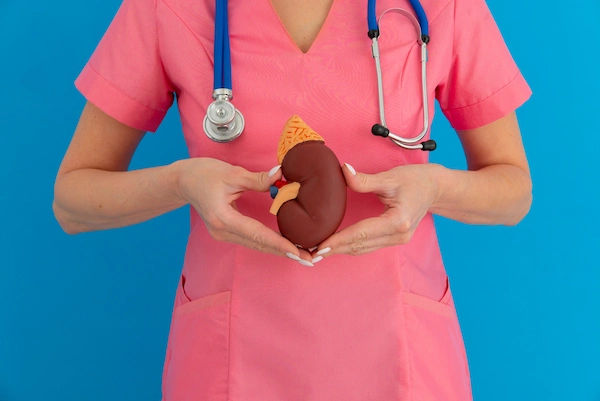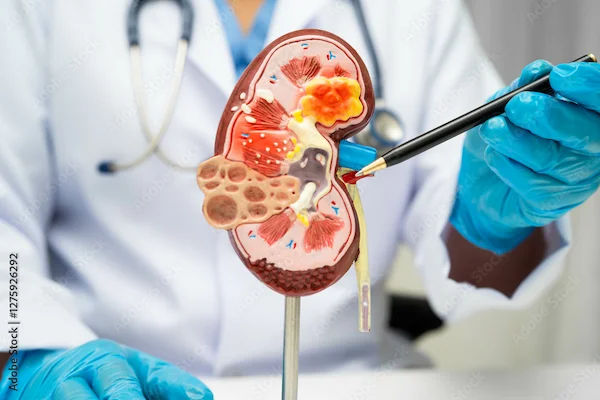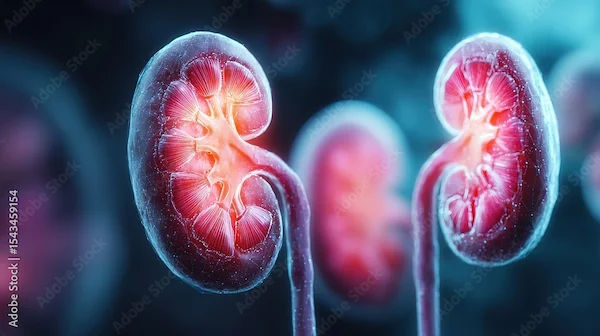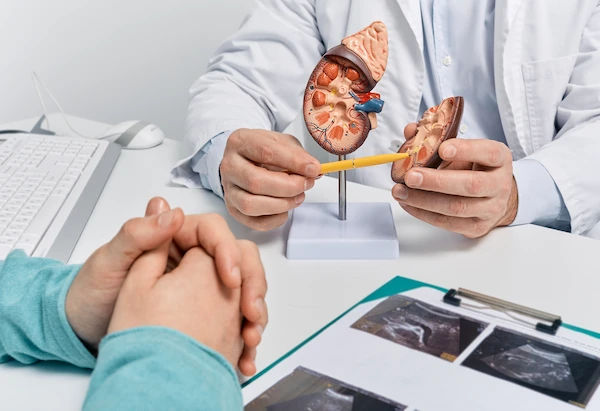Your Complete Guide to Kidney Health: Protect Your Vital Filters
Know about kidney health, what it is, the role of the kidney in your body, and recognising signs and symptoms. Learn about the essential tests for the kidneys.

Written by Dr. Dhankecha Mayank Dineshbhai
Reviewed by Dr. Rohinipriyanka Pondugula MBBS
Last updated on 13th Jan, 2026

Introduction
Your kidneys are the hardworking, silent heroes of your body, performing a life-sustaining cleanup job 24/7. Yet, we rarely give them a second thought—until something goes wrong. Chronic Kidney Disease (CKD) is a stealthy epidemic, often showing no symptoms until significant, irreversible damage has occurred. On World Kidney Day and beyond, it's crucial to turn our attention to these vital organs. This comprehensive guide will empower you with the knowledge to understand your kidney function, recognise the subtle warning signs of trouble, and take proactive steps to safeguard your long-term health. Let's dive into the essential strategies for prevention, the latest screening advice, and how to champion your own well-being.
Why Your Kidneys Are Your Body's Unsung Heroes
Nestled in your lower back, these two bean-shaped organs are biochemical powerhouses. Think of them as your body's most sophisticated water filtration plant, but their job description is far more extensive. Every day, they process about 200 quarts of blood to sift out about 2 quarts of waste products and extra water, which become urine. This process is vital for maintaining a stable balance of body chemicals. However, their role extends far beyond just waste management, making them critical to your overall health.
The Master Chemists: Filtration and Waste Removal
The primary function of your kidneys is to filter your blood. Tiny units inside them, called nephrons, act as microscopic sieves. They remove waste products like urea (from protein metabolism) and creatinine (from muscle metabolism), ensuring these toxins don't build up to dangerous levels in your bloodstream. This precise filtration system also manages the body's levels of essential minerals like sodium, potassium, and phosphorus, which are crucial for nerve function, muscle contraction, and bone health.
Consult a Nephrologist for Personalised Advice
Beyond Filtration: Hormones, Blood Pressure, and Bones
Your kidneys are endocrine organs too. They produce:
- Renin: An enzyme that helps regulate blood pressure. When blood pressure drops, the kidneys release renin to constrict blood vessels and raise it.
- Erythropoietin (EPO): A hormone that signals your bone marrow to produce red blood cells. This is why kidney disease often leads to anaemia.
- Active Vitamin D (Calcitriol): They convert vitamin D from sunlight and food into its active form, which is essential for calcium absorption and strong bones.
When kidneys fail, all these systems are disrupted, leading to a cascade of health issues.
The Silent Threat: Understanding Chronic Kidney Disease (CKD)
Chronic Kidney Disease means your kidneys are damaged and can't filter blood as well as they should. This damage typically happens slowly over a long period. The insidious nature of CKD is that you can lose up to 90% of your kidney function without experiencing any major symptoms. This is why awareness and early testing are non-negotiable.
The Alarming Stages of CKD (Stage 1 to 5)
CKD is classified into five stages based on your Glomerular Filtration Rate (GFR), a measure of filtering capacity.
- Stages 1 & 2: Kidney damage with normal or mildly reduced GFR. Often detected only through specific tests showing protein in the urine.
- Stage 3: Moderately reduced GFR. This is often when symptoms like swelling and fatigue may begin, but they are easily mistaken for other issues.
- Stage 4: Severely reduced GFR. Serious preparation for end-stage treatment begins.
- Stage 5: Kidney failure. The kidneys have lost nearly all ability to function, requiring dialysis or a transplant to survive.
Are You at Risk? The Major Culprits of Kidney Damage
The two leading causes of CKD, accounting for nearly two-thirds of cases, are:
1. Diabetes: High blood sugar damages the delicate blood vessels in the kidneys' filters.
2. High Blood Pressure (Hypertension: Uncontrolled force damages blood vessels throughout the body, including those in the kidneys.
Other significant risk factors include a family history of kidney disease, heart disease, obesity, recurrent kidney stones, prolonged use of certain medications (e.g., NSAIDs like ibuprofen), and being over 60.
Listening to the Whispers: Early Warning Signs of Kidney Trouble
Because kidney disease is "silent," paying attention to subtle changes is key. The symptoms are often non-specific, meaning they can be attributed to many other conditions.
Subtle Symptoms You Might Ignore
- Fatigue and trouble concentrating: Caused by anaemia and toxin buildup.
- Poor appetite: A general feeling of being unwell.
- Dry, itchy skin: From mineral and bone disease.
- Puffiness around the eyes, swollen ankles/feet: Caused by the kidneys' inability to remove extra fluid and sodium (oedema).
- Foamy urine: Indicating protein leakage (albuminuria).
- Needing to urinate more often, especially at night.
When to Sound the Alarm and See a Doctor
If you experience a combination of these symptoms, particularly if you have risk factors like diabetes or high blood pressure, it's time to get checked. If symptoms persist beyond two weeks, consult a doctor online with Apollo24|7 for further evaluation. They can quickly order the necessary tests to assess your kidney function.
Your Kidney Health Action Plan: Prevention is Key
The best treatment for CKD is prevention. By adopting a proactive lifestyle, you can significantly reduce your risk and protect your kidney function.
Fueling Your Filters: A Kidney-Healthy Diet
A balanced diet low in sodium, processed meats, and sugary drinks is fundamental. Focus on:
- Fresh fruits and vegetables
- Lean proteins like fish and poultry
- Whole grains
- For those with existing kidney damage, monitoring intake of potassium and phosphorus becomes critical. Consulting a nutritionist can provide personalised guidance.
Move It: The Role of Exercise in Kidney Function
Regular physical activity helps control weight, lower blood pressure, and reduce the risk of CKD's leading causes: diabetes and heart disease. Aim for at least 30 minutes of moderate exercise most days of the week.
Hydration Hacks: How Much Water is Right?
Staying hydrated helps your kidneys clear sodium, urea, and toxins from the body. While the "8 glasses a day" rule is a good starting point, individual needs vary. Clear or light yellow urine is a good indicator of proper hydration. If your condition does not improve after trying these methods, book a physical visit to a doctor with Apollo24|7 to get tailored advice.
The Power of Knowledge: Essential Kidney Tests Everyone Should Know
You can't manage what you don't measure. Two simple tests are the cornerstone of kidney health screening.
Decoding Your Blood Test: eGFR and Creatinine
The estimated Glomerular Filtration Rate (eGFR) is the best measure of kidney function. It's calculated from your serum creatinine level (a waste product), along with your age, sex, and body size. A low eGFR indicates reduced kidney function. Apollo24|7 offers convenient home collection for tests like a basic or comprehensive metabolic panel that includes creatinine and eGFR calculation.
The Urine Test: Checking for Protein (Albuminuria)
Healthy kidneys keep protein in the blood. When filters are damaged, protein leaks into the urine. A urine test (ACR - Albumin-to-Creatinine Ratio) detects this leakage, often the earliest sign of kidney damage, even before eGFR declines.
Conclusion
Your kidneys perform a monumental task with quiet efficiency, but they rely on you to provide the right support. Understanding their function, acknowledging your personal risk factors, and recognising the often-missed signs of trouble are the first steps toward lifelong kidney health. This World Kidney Day, pledge not to take these vital filters for granted. Schedule that annual check-up, talk to your family about their health history, and commit to the lifestyle choices that keep your body's purification system running smoothly.
Consult a Nephrologist for Personalised Advice
Consult a Nephrologist for Personalised Advice

Dr. Manju Kamal
Nephrologist
12 Years • MBBS,MD(General Medicine), DNB,DM(Nephrology)
Angamaly
Apollo Hospitals Karukutty, Angamaly

Dr. Pardha Saradhi
Nephrologist
9 Years • MBBS, MD-DNB (Gen. Med.), DNB (Nephro)
Hyderabad
Apollo Hospitals D R D O kanchanbagh, Hyderabad
(75+ Patients)

Dr. Kity Sarkar
Nephrologist
15 Years • MBBS,MD(Genl. Med.), DrNB(NEPHROLOGY)
Kolkata
Dr. Kity Sarkar's Clinic, Kolkata
Dr Ch Sashidhar
Nephrologist
20 Years • MBBS, MD General Medicine, DNB, Nephrology
Secunderabad
Apollo Hospitals Secunderabad, Secunderabad
Dr. Nithyashree Nandagopal
Nephrologist
10 Years • DNB (Gen Med), DNB (Nephrology)
Chennai
Apollo Hospitals Greams Road, Chennai
(275+ Patients)
Consult a Nephrologist for Personalised Advice

Dr. Manju Kamal
Nephrologist
12 Years • MBBS,MD(General Medicine), DNB,DM(Nephrology)
Angamaly
Apollo Hospitals Karukutty, Angamaly

Dr. Pardha Saradhi
Nephrologist
9 Years • MBBS, MD-DNB (Gen. Med.), DNB (Nephro)
Hyderabad
Apollo Hospitals D R D O kanchanbagh, Hyderabad
(75+ Patients)

Dr. Kity Sarkar
Nephrologist
15 Years • MBBS,MD(Genl. Med.), DrNB(NEPHROLOGY)
Kolkata
Dr. Kity Sarkar's Clinic, Kolkata
Dr Ch Sashidhar
Nephrologist
20 Years • MBBS, MD General Medicine, DNB, Nephrology
Secunderabad
Apollo Hospitals Secunderabad, Secunderabad
Dr. Nithyashree Nandagopal
Nephrologist
10 Years • DNB (Gen Med), DNB (Nephrology)
Chennai
Apollo Hospitals Greams Road, Chennai
(275+ Patients)
More articles from Kidney Disease
Frequently Asked Questions
What are the first signs of kidney problems?
The earliest signs are often detectable only through lab tests (protein in urine). Later, subtle symptoms include fatigue, puffiness around the eyes, swollen ankles, changes in urination frequency, and foamy urine.
Can damaged kidneys heal?
Kidneys have a limited ability to repair themselves. The goal is to prevent further damage. Early-stage CKD can often be managed effectively to slow or halt progression. Once significant scarring occurs, it is usually irreversible.
How can I check my kidneys at home?
You cannot fully assess kidney function at home. While you can monitor blood pressure and look for symptoms, a proper diagnosis requires a blood test for eGFR and a urine test for albumin. Apollo24|7 offers convenient home collection for these tests.
What is the best drink for your kidneys?
Water is the best and safest choice for most people. It helps clear sodium and toxins without adding calories, sugar, or phosphorus, which are found in sodas and some fruit juices.
Are kidney stones a sign of kidney disease?
Not always, but recurrent kidney stones can cause obstruction and damage, leading to CKD. Having stones also increases your risk of developing them again, so prevention through diet and hydration is key.
_2.webp)



